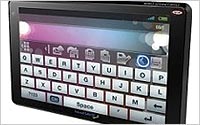 Despite seeing more than 100 tablet models released in 2011, consumers are mostly unfamiliar with all but a few brands -- namely the iPod, the Kindle
Fire and perhaps, the Nook. The problem for most of the year, according to Andrew Eisner, director of content for consumer electronics site Retrevo.com, is that most tablet manufacturers could not
afford to undersell Apple.
Despite seeing more than 100 tablet models released in 2011, consumers are mostly unfamiliar with all but a few brands -- namely the iPod, the Kindle
Fire and perhaps, the Nook. The problem for most of the year, according to Andrew Eisner, director of content for consumer electronics site Retrevo.com, is that most tablet manufacturers could not
afford to undersell Apple.
“There were an awful lot of android tablet announcements and everyone tried to capitalize on the popularity that arose around the iPad,” Eisner tells
Marketing Daily. “We put forth a theory that there might be a flaw in the Google business model. Once these hardware vendors sell their [tablets] hardware, they lose out on any revenue
after that.”
advertisement
advertisement
For much of the year, the sticking issue for many consumers was price. With very little difference between features and price, consumers continued to opt for Apple’s
better-known product. But when Amazon announced its Kindle Fire at a $199 price point, the option to go for something other than Apple was easier, Eisner says. According to a Retrevo survey from July
2011, nearly 80% of consumers said they would be willing to buy an Android-powered tablet (with features similar to an iPad) if it were priced below $200.
“No one was able to have
success with the tablet until Amazon broke the $250 price barrier,” Eisner says. “It does look like a two-horse race because Amazon can afford to lose money on the profits from the
hardware in order to pick up the difference on other offerings.”
Going into 2012, the picture for most Android makers doesn’t seem to get much better, Eisner says Apple is already
expected to introduce an iPad 3 during the year, and may come out with a 7-inch version that would be priced lower than its current 9-inch tablets, Eisner says.
“There’s a
feeling that Amazon legitimized the 7-inch tablet. If 7-inch does catch on, as it appears to be doing, Apple might feel the need o come out,” Eisner says. “I think it’s going to be
very challenging for the tablet hardware manufacturers because they’re still stuck having to make money on the hardware itself, and when they do that they can’t undersell Apple.”
One place many tablet makers may find a break is through the use of tablets as a connective device for televisions, Eisner says. Samsung and Sony -- two brands that are well-established in the
living room -- could make a case for Android-powered tablets that work well with consumers’ television sets.
“The tablet will become something of an accessory. It could provide the
smarts in a smart TV,” he says. “Not only will it be a remote control and a TV guide -- it could serve as a recommendation engine and voice command. It continues to be the model for the
living room.”